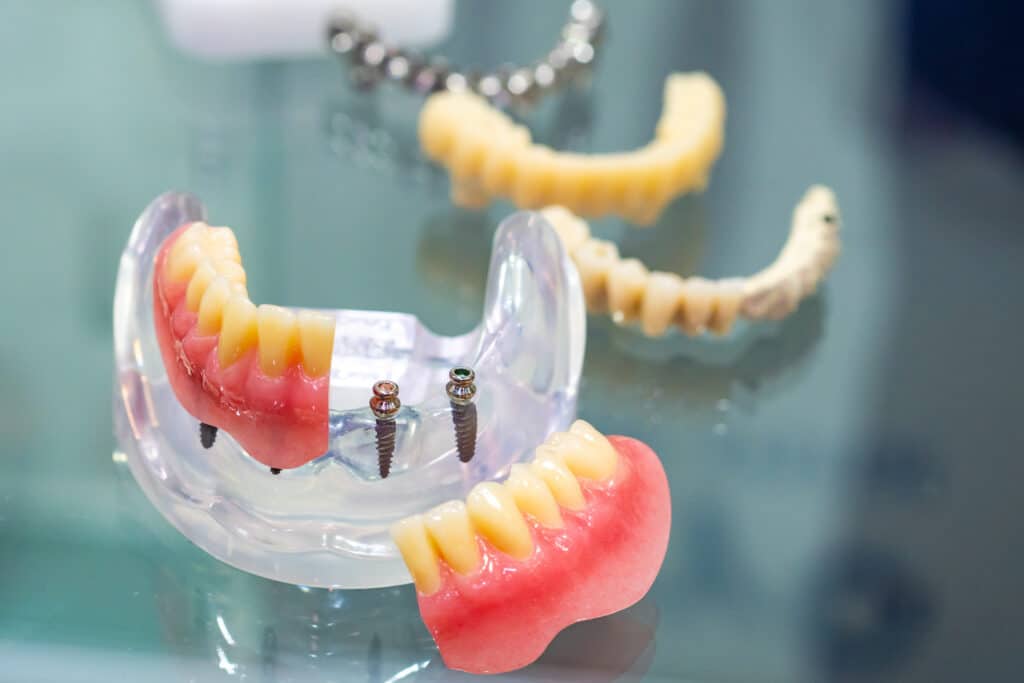When it comes to dental implants, patients and professionals alike aim for long-term success. However, certain factors can impact the success rate of dental implants, and one of the most significant yet often misunderstood is the role of bisphosphonates and dental implant failure in Louisville. These medications are widely prescribed to help strengthen bones, but they may present unique challenges in dental care.
If you’re considering a dental implant and currently taking osteoporosis medications, this article will help you better understand the connection. With insights from Louisville implant dentist Dr. Regan Ackerman, we’ll explore what causes implant failure, the potential impact of bisphosphonates, and essential strategies for successful dental implant procedures.
What Are Bisphosphonates and How Do They Impact Dental Implants?
Bisphosphonates, (also typically known as osteoporosis medications) are common medications prescribed to treat osteoporosis and other bone-related conditions. They help prevent bone loss by slowing down the natural bone resorption process, reducing the risk of fractures in patients with weakened bones. Popular medications in this category include alendronate (Fosamax), ibandronate (Boniva), and risedronate (Actonel).
While their primary role is to improve bone density and reduce fracture risks, bisphosphonates have a long half-life and accumulate in bone tissues over time. This can create unique challenges, especially when it comes to oral surgical procedures like dental implants, where optimal bone healing is essential for success.
How Could Bisphosphonates Affect Implants?
Bisphosphonates can impair the body’s ability to remodel and repair bone tissue, which plays a vital role in integrating dental implants. This effect increases the risk of implant failure, mainly if one uses the medication over a long period. Another potential complication associated with bisphosphonates is a rare but serious condition called bisphosphonate-related osteonecrosis of the jaw (BRONJ), where jawbone tissues fail to heal after procedures, leading to prolonged exposure and potential damage.
Understanding this connection can provide context for why your dentist or oral surgeon might take additional precautions in planning your implant procedure.
Understanding Implant Failure: Causes and Common Misconceptions
What Causes Implant Failure?
Dental implants are highly effective and long-lasting solutions for tooth replacement, but success isn’t guaranteed. Some key factors that impact implant success include:
- Poor bone quality or insufficient bone volume
- Uncontrolled systemic conditions (e.g., diabetes, rheumatoid arthritis)
- Poor oral hygiene leads to gum infections like peri-implantitis
- Lifestyle habits, such as smoking, which reduces blood flow and healing capacity
- Medications, including bisphosphonates and other drugs, influence bone healing.
Clearing Up Misconceptions
Contrary to common belief, implant failure isn’t solely caused by the medications you take. With the proper precautions, even patients on bisphosphonates can enjoy successful outcomes. The key lies in open communication with your dentist and a tailored treatment plan.
Research Insights Into Bisphosphonates and Implant Complications
Linking Bisphosphonates and Implant Failure
Numerous studies have investigated the impact of bisphosphonates on dental implant survival. While findings vary, researchers generally agree that bisphosphonates or osteoporosis medications can delay bone healing and osseointegration—the process where the implant fuses with the jawbone. This delay increases the risk of early implant failure.
Additionally, patients on oral bisphosphonates have a lower risk of complications than those using intravenous bisphosphonates, which carry a higher risk of BRONJ. If you are taking osteoporosis medications, it’s essential to understand which type you’re taking and how it might influence your implant procedure.
Data You Should Know
- A 2018 meta-analysis found that long-term use of oral bisphosphonates increased implant failure risk by approximately 2%.
- Intravenous bisphosphonates used for advanced conditions showed a stronger correlation with complications like BRONJ.
- With proper risk assessments, patients on bisphosphonates have a high likelihood of implant success.
Managing Patients on Bisphosphonates and Successful Implant Outcomes in Louisville
Precautions Your Dentist Will Take
If you’re on bisphosphonates and considering dental implants, a well-structured preparation plan is essential. Your dental team at Freedom Mini Dental Implants may employ the following precautions to ensure your procedure is successful:
- Comprehensive Medical and Dental History Review: Your dentist will carefully analyze your medical history, including the dosage, duration, and type of bisphosphonates you’re taking.
- Collaboration With Your Physician: If necessary, your dentist may consult with your prescribing doctor to evaluate whether pausing or modifying your osteoporosis medication before surgery is an option. Some therapies may involve a “drug holiday” to give your bones time to recover normal remodeling function.
- Minimizing Trauma During Surgery: Surgical techniques will be adjusted to reduce bone exposure and trauma, ensuring a gentler procedure with less risk of postoperative complications.
- Post-Operative Monitoring: After the implant placement, your dentist will schedule regular follow-ups to monitor healing progress and immediately address any warning signs of complications.
Empowering Yourself for Success
You also play an essential role in ensuring a successful dental implant. Here’s how you can support your outcome:
- Maintain Excellent Oral Hygiene to prevent infections around the implant site.
- Follow Dietary Guidelines for proper healing and optimal nutrition.
- Communicate Openly with your dental team. Inform them about any changes to your medical history, medications, or symptoms you experience post-surgery.
Make an Informed Decision With Confidence
Dental implants are a life-changing investment that restores both function and aesthetics. If you’re on osteoporosis medications like bisphosphonates, don’t assume these medications automatically exclude you from successful implant treatment. By working with an experienced dentist like Louisville’s Dr. Regan Ackerman, you can better understand your risk factors and take the necessary steps to ensure a positive outcome.
If you’d like to learn more about dental implants and how they can fit your unique health needs, schedule a consultation with Dr. Regan Ackerman today at Freedom Mini Dental Implants. Let’s work together to restore your dental health with confidence!






